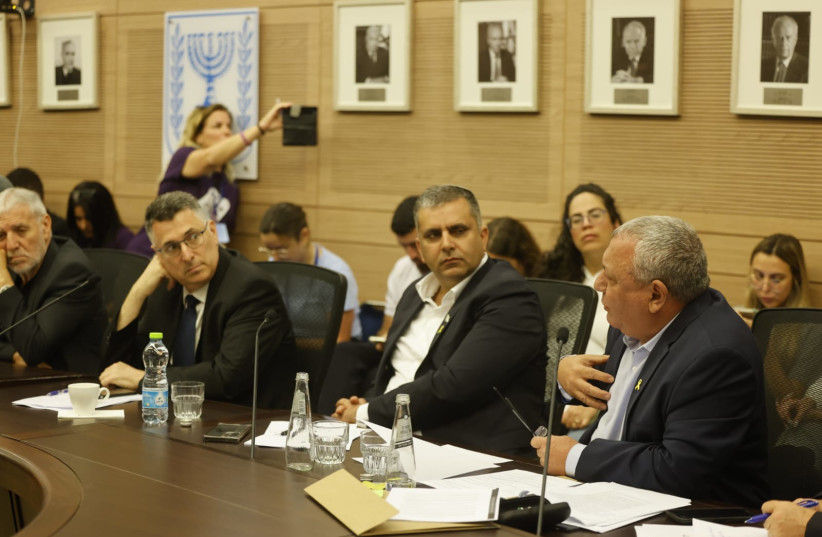Prime Minister Benjamin Netanyahu’s governing coalition will head into the three-month summer recess on Monday in arguably its best shape since the Hamas massacre on October 7.
The prime minister himself will be returning from a trip to the US after a powerful speech in Congress and photo-ops with the outgoing president and both likely candidates in the upcoming presidential election.
Reactions in Israel to the speech itself broke down roughly according to party lines. All of the coalition’s party leaders commended it, and, notably, National Unity chairman Benny Gantz also offered lukewarm praise.
The opposition’s center-left- and left-wing parties criticized it, and the opposition’s right-wing parties remained silent. But it is hard to argue with the fact that Netanyahu’s rhetorical skills in English, unparalleled in Israel, were on full display, and alongside the high-profile meetings and barring any unforeseen situations, the prime minister and his team are likely to view the trip as a political success.
The haredi parties scored a major victory late Wednesday night with the passing of the kosher cell phone bill, which enables a powerful committee of rabbis, made up of representatives of most major haredi groups, to gain control of a swath of cell phone numbers earmarked for “kosher” phones, i.e. without internet.
The haredi parties are worried about two major issues – maintaining state subsidies for yeshiva students, and an increasing draft of haredim into the IDF.
But the Defense Ministry and IDF seem to have solved that problem for them, at least for the time being. The IDF will be drafting just 3,000 haredim into the IDF until the summer of 2025, on top of approximately 1,800 haredim already signed up for existing programs.

While this is a significant increase, it is a relatively small number compared to 60,000+ haredim men of military age who no longer have a legal exemption.
The funding issue is directly related to the draft issue. Israel’s attorney-general is currently preparing a legal opinion over whether or not the state can continue providing benefits such as daycare discounts and tax cuts to families of men who are officially avoiding the draft. But with the IDF not having called for a large majority of them, the AG will find it hard to argue that they are active draft-dodgers, and the benefits are unlikely to cease.
National Security Minister MK Itamar Ben-Gvir also scored a late-night victory on Wednesday, when, in exchange for his party’s support for the kosher cell phone bill, the haredi parties agreed to join the rest of the coalition in shifting the National Unit for Enforcing Planning and Construction Laws from the Finance Ministry to Ben-Gvir’s National Security Ministry.
The unit was formed in 2017 as part of a law known as the Kamenetz Law, whose purpose was to tighten enforcement of illegal construction, especially in the Arab sector. A central theme in Ben-Gvir’s 2022 election campaign was a crackdown on illegal Arab construction, and while the Arab MKs have criticized him for failing miserably on combating violent crime, he can now attempt to utilize his new unit to show his voting base that he is following through on his campaign promise.
Finance Minister Bezalel Smotrich’s Religious Zionist Party is also riding high, after a series of measures against the Palestinian Authority were approved in recent weeks, including the retroactive official approval for five settlements located in what Smotrich has said are “strategic areas” in the West Bank.
Smotrich, however, is facing a major hurdle in the coming weeks – the beginning of work on the 2025 budget, which is expected to include many unpopular measures in order to cover for the vast war expenditures. Furthermore, despite his recent settlement successes. Smotrich is consistently polling under the electoral threshold.
Debates over hostage deal
Both Ben-Gvir and Smotrich have threatened to leave the government if Netanyahu enters a hostage deal that they believe includes too many concessions. But Ben-Gvir in recent weeks has noticeably stopped issuing these threats, and a government minister from the Likud reasoned this week that Ben-Gvir may oppose a deal in public and vote against it in the cabinet, but may not leave the government#.
And while Smotrich has stuck to his threat, with his polling numbers so low he may eventually opt to remain in the government as well, the minister said.
Even if Smotrich and/or Ben-Gvir decide to leave the government over a hostage deal, this does not mean that they will immediately vote to dissolve the Knesset and bring down the government. Although unlikely, with the Knesset out of session for the next three months, the two parties may opt not to topple the government and see how the hostage deal plays out. Then, when the Knesset reconvenes in late October, they can decide whether or not to rejoin the government or dissolve the Knesset.
Gantz accused Netanyahu this week of setting up this exact scenario. According to Gantz, Israel approved the proposal for the hostage deal currently on the table two months ago, and the negotiating team has sat idle for over a week while Netanyahu delayed a response to the latest counteroffer. Gantz argued that Netanyahu was intentionally waiting for the summer recess in order to proceed, with the hope that his government will be able to survive a deal, or at least survive until late October or early November.
Stuck in the middle are the families of the 120 remaining hostages, dead and alive. The coalition party leaders can enjoy their recent achievements and pride themselves in having weathered the summer session. But hostages continue to die in captivity, and as long as they are not home the government should be proud of nothing.
